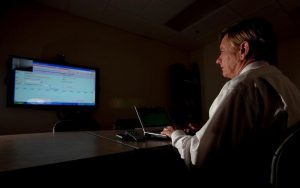First interactive, remote hearing test will expand access to care

Dr. Gregg Givens, chairman of the Department of Communication Sciences, demonstrates the remote diagnostic hearing assessment that allows interaction between clinician and patient. Givens was one of the assessment?s creators.
GREENVILLE, N.C. — An East Carolina University professor is among the creators of the first real-time, remote diagnostic hearing assessment that allows interaction between clinician and patient — a low-cost development that could bring much-needed treatment to rural and low-income patients around the world.
“There are people throughout the world who have no access to professional hearing health care,” said Dr. Gregg Givens, chairman of the Department of Communication Sciences and a practicing clinical audiologist. “This gives clinicians the ability to remotely diagnose and treat hearing loss.”
ECU and Otovation, a leading provider of audiometer products for hearing professionals and care providers worldwide, are working together to make the system available, with a projected release date of mid-2011.
“Dr. Givens and his colleagues were visionary in seeing this many years ago as a potential improvement in assisting and delivering care for patients,” said Dave Davis, founder and president of Otovation. “We at Otovation believe very strongly in the quality of what they have developed, and we look forward to continuing to work with ECU in developing and bringing this important service to market.”
Hearing loss often goes untreated. The National Institutes on Deafness and Other Communication Disorders, a federal agency, estimates that only one in five people who could benefit from a hearing aid actually wears one.
For rural and low-income populations, access to hearing health care can be scarce. In eastern North Carolina, for instance, some counties have no audiologist. “Hearing health care in some of these communities just doesn’t exist,” Givens said.
Innovations in telemedicine offer ways to increase access to services while improving quality of care and reducing costs. With this new hearing system, clinicians can remotely test patients around the world through local or area-wide networks as well as the Web. Assessments can even be performed using smart phones and tablet PCs.
The hearing test system will be suitable for use in varied settings, including nursing homes, schools, hospitals, correctional facilities and military settings.
Givens and his colleagues began working on the project in the early 1990s as a way to get hearing care to people in rural and under-served areas. In the early years of development, they were stymied by hurdles in software and hardware development. The first Internet-based test on campus was conducted in the late 1990s, Givens said. The first of two patents was issued in 2005.
“It’s exciting to see something you envisioned finally coming to reality,” Givens said.
To learn more, contact Givens at givensg@ecu.edu or 252-744-6080. For more information on Otovation, contact Davis at dave@otovation.com or 610-768-9300.